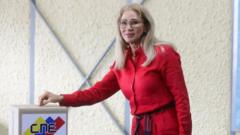Venezuela's ruling party, the United Socialist Party of Venezuela (PSUV), has announced what it calls an "overwhelming victory" in the recent regional and parliamentary elections. The news follows a significant boycott by most opposition parties, which labeled the voting process a "farce." The electoral council (CNE), allegedly influenced by the government, reported that PSUV candidates won governorships in 23 out of 24 states and amassed over 82% of the votes for the National Assembly.
Opposition leader María Corina Machado criticized the turnout, claiming that fewer than 15% of Venezuelans participated, stating, "More than 85% of Venezuelans did not obey this regime and said 'no.'" While the CNE estimates that 42.6% of the electorate engaged, independent reports indicated much lower turnout than during July’s presidential election.
Past instances have raised doubts about the CNE’s autonomy, particularly after last year's indefinitely announced presidential election results. The opposition's own tallies had suggested significant support for their candidate, Edmundo González, who fled to Spain following a clampdown on dissent. Meanwhile, Machado prioritized respecting that electoral outcome, advocating for a boycott of the current elections, asserting, "We voted on 28 July. On 25 May, we won't vote." A few opposition figures, such as Henrique Capriles, defied this stance, arguing that participation was crucial, a decision that sparked accusations of betrayal from fellow opponents.
The PSUV’s victories included regained governorships in Zulia and Barinas, the native state of Hugo Chávez, with only Cojedes remaining under opposition control. Despite claims of an electoral triumph, the backdrop to this vote included a crackdown on dissent, with authorities arresting over 70 alleged opposition supporters for purportedly plotting to sabotage the election. The detainment of Juan Pablo Guanipa, a key ally of Machado, was declared "state terrorism" by Machado.
In a contentious twist, Venezuelan voters also participated in a symbolic election for representatives of the Essequibo region, a disputed territory with Guyana, despite the International Court of Justice’s directives against such a move. The resulting election of loyalist Neil Villamizar as "governor of Essequibo" has drawn sharp condemnation from Guyana. President Irfaan Ali termed it "scandalous," vowing to maintain territorial integrity amid rising tensions between the two nations.


















